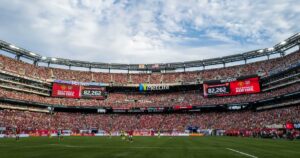Anyone who has watched Glasgow Rangers play this pre-season was not shocked by the 2-1 loss in Lithuania to FBK Kaunas. Less than three months after appearing in the UEFA Cup Final in Manchester, Rangers are now out of Europe until next year.
The defeat means that Rangers will miss out on £12m, which they would have been guaranteed had they qualified for the first stage proper of the competition. That financial loss might be a bigger blow to the club than the score on the field.
While Rangers and Celtic play in front of packed houses every week, they are falling further and further behind the top clubs in England and Europe in terms of finance. The Old Firm pair have never been able to compete with the likes of Liverpool and Man United for a player. Today they cannot complete with the likes Sunderland, West Ham and Manchester City, all middle of the table Premier League teams.
This is despite the record financial returns in terms of turnover and profit that Celtic have announced in the past two annual reports.It is telling that in the three years that Wee Gordie has been at Celtic Park, the most he has spent on a single player has been the £4m paid to Hibernian for Scott Brown last summer. Eight years ago, his predecessor, Martin O’Neill, was able to buy Chris Sutton, Neil Lennon and John Hartson, each costing upwards of £6m.
Rangers were forced to accept some time ago that their days of lavish expenditure were over and now both Old Firm managers are in the difficult position of having to wait until their wealthier English neighbors have had their fill and then sift through the leftovers.
It is a vicious circle having little funds for players. It means that you cannot attract the top players that you need to compete with the top clubs, which results in mixed success in Europe. Those European Finals that Rangers and Celtic have reached are looking to be once in a generation events instead of regular happening.
Yes the Glasgow pair will continue to dominate the Scottish Premier League and they will qualify for the Champions League again next year. But the gap between them and the top clubs in Europe is getting wider every year and they will soon find themselves viewed as second and third tier European teams like Feyenoord, Anderlecht and Olympiacos.


